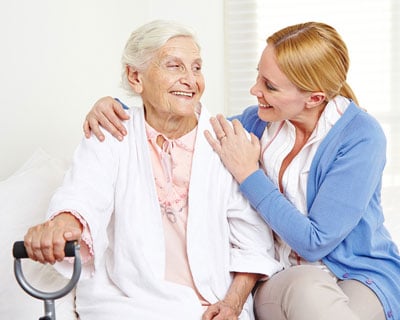 Family caregivers have a tough job and a huge responsibility. Alarmingly, however, these caregivers are often marginalized as they go about their tasks of caring for their elderly family members.
Family caregivers have a tough job and a huge responsibility. Alarmingly, however, these caregivers are often marginalized as they go about their tasks of caring for their elderly family members.Terry Fulmer, RN, PhD, FAAN, president of the John A. Hartford Foundation, observes: "Family caregivers of older adults are almost invisible in our health care system, yet the system could not function without them."
Caregiver Challenges Now and in the Future
According to a National Academies of Sciences, Engineering and Medicine report entitled "Families Caring for An Aging America", there are currently 17.7 million people in America providing care to an aged family member who needs help because of a limitation in physical, mental, or cognitive functioning. The care that these family members provide improves the life of seniors and helps keep the cost of health care down for the entire nation. Yet, this service in behalf of their elders puts significant strain on family caregivers.
Richard Schulz, committee chair and Distinguished Service Professor of Psychiatry at the University of Pittsburgh, notes: "Ignoring family caregivers leaves them unprepared for the tasks they are expected to perform, carrying significant economic and personal burdens ... Caregivers are potentially at increased risk for adverse effects in virtually every aspect of their lives - from their health and quality of life to their relationships and economic security. If the needs of the caregivers are not addressed, we as a society are compromising the well-being of elders."
AARP notes some of the specific areas of concern for family caregivers, including:
- The exclusion of family caregivers from treatment decisions and care planning for the elderly.
- Shorter hospital stays, mandated by Medicare and private insurance payers, which place a burden on families to handle the transition of their elderly loved one from hospital to home without adequate support.
- The expectation that family members with little or no medical training can handle technical procedures and equipment, such as feeding and drainage tubes.
While caregivers are already burdened, the problem is likely to intensify in coming years. It is estimated that by 2030, one in five Americans will be over the age of 65. As the senior population rises, the need for people to care for them will rise as well. The problem is that the pool of potential caregivers is actually shrinking.
NextAvenue.org reports: "Americans are having fewer children. More aging adults have no children. There have been increases in the ranks of the never-married and the divorced. Those who have children may live farther away from them than did generations past."
Home Care Provides a Solution
For those families who are experiencing hardship in caring for a loved one with physical or mental issues, home care provides much needed support. And it seems likely that in coming years, the demand for home care will continue to increase.

Home care enables your loved one to stay in a comfortable and familiar environment while still receiving the kind of care needed for a good quality of life. A home care agency will partner with you to provide comfort and support for your loved one.
Meanwhile, home care workers can provide you with peace of mind, knowing that your loved one is cared for even when you are unable to be present to do so. To find out about all the services home care can provide for your family, please contact us today.

